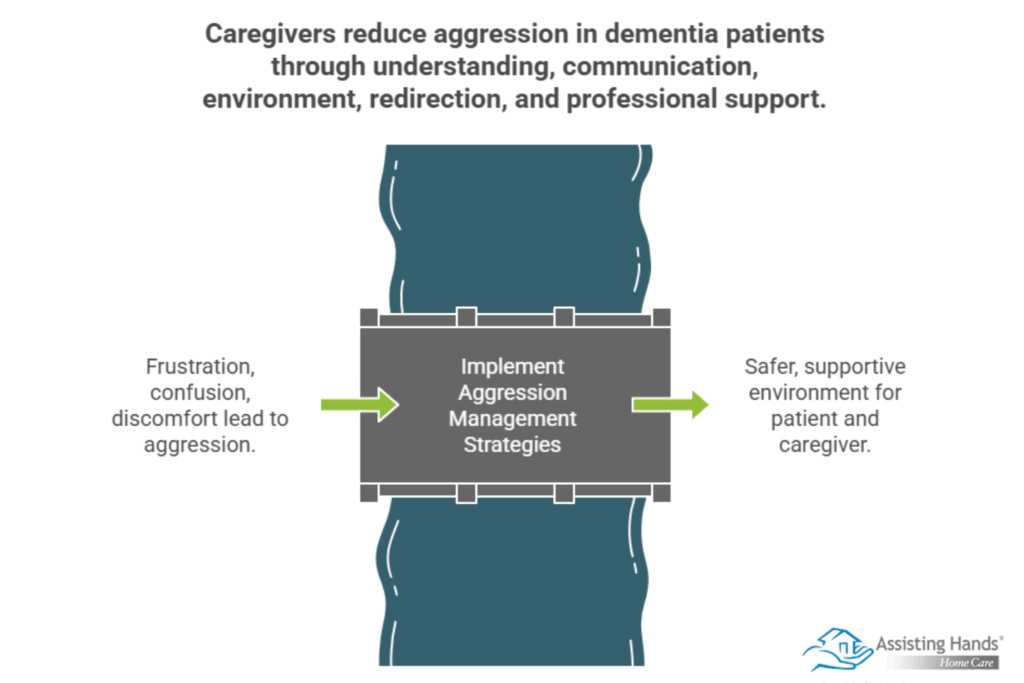
Table of Content
Aggression is a common symptom seniors with dementia experience, often stemming from frustration, confusion, or discomfort. While these behaviors can be challenging for caregivers, implementing specific strategies can help you create a safer and more supportive environment for both you and your aging loved one with dementia.
Understand the Root Cause of Aggression
Aggression in dementia patients is often tied to unmet needs or external triggers. Understanding the underlying causes is the first step in managing such behaviors effectively. Common triggers may include:
- Physical discomfort – Pain, hunger, or fatigue can lead to aggressive outbursts.
- Environmental factors – Loud noises, crowded spaces, or overstimulation can increase agitation.
- Cognitive challenges – Difficulty understanding surroundings or tasks can cause frustration.
Observe your loved one’s behavior closely and note patterns or situations that lead to aggression. This insight can help you identify and address the causes before they escalate.
The cognitive challenges that accompany dementia often leave aging adults unable to manage everyday tasks, which puts their safety and health at risk. If your senior loved one has been diagnosed with a serious condition and needs help with tasks like meal prep, transportation, bathing, and grooming, reach out to Assisting Hands Home Care, a leading provider of home care families can trust. We also offer comprehensive care for seniors with dementia, Alzheimer’s, and Parkinson’s.

Communicate Calmly and Clearly
Effective communication is essential when addressing aggression in dementia patients. Frustration often arises from misunderstandings, so you can take the following steps to communicate more effectively:
- Keep instructions simple – Break down tasks into smaller, manageable steps.
- Use nonverbal cues – Smiles, gentle touches, and calm gestures can reassure your loved one.
- Avoid arguing – Disagreements can escalate situations. Instead, validate your loved one’s feelings and redirect his or her focus.
For example, if your loved one becomes upset about wanting to “go home,” instead of dismissing his or her feelings, try saying “Tell me about your home” and redirect attention to positive memories.
Create a Calm and Safe Environment
A peaceful environment can have a significant impact on reducing aggression. Ensuring your loved one’s surroundings are safe and soothing can help him or her feel more secure. Consider the following strategies:
- Minimize noise and clutter – Reduce visual and auditory distractions.
- Maintain a routine – Familiar schedules can provide a sense of stability.
- Use calming activities – Engage in activities such as listening to soft music, enjoying nature, or working on a simple puzzle.
By creating predictable and comforting surroundings, you can alleviate anxiety, which is often a precursor to aggression.
Employ Redirection and Distraction Techniques
Distraction is a powerful tool for defusing aggressive behaviors. Changing the focus of your loved one’s attention can quickly reduce agitation and prevent escalation. Here are some examples:
- Introduce a favorite activity – Offer a craft, game, or familiar task your loved one enjoys.
- Shift the conversation – Bring up a positive memory or topic of interest.
- Provide a sensory object – Items such as textured blankets or stress-relief tools can redirect your loved one’s energy.
Keep in mind redirection should be approached with patience and care. Forcing a change in focus may backfire, so it’s important to gauge your loved one’s reaction and adapt accordingly.
Symptoms such as agitation, confusion, anger, and frustration are common in elderly people with dementia. Aging in place can present a few challenges for seniors living with dementia. However, they can still live independently at home with the help of professional dementia care. Frederick families can rely on Assisting Hands Home Care to provide their elderly loved ones with mental and social stimulation, timely medication reminders, assistance with meal prep, and much more. Our caregivers are available around the clock to help your loved one live a happier and healthier life.
Seek Professional Support and Resources
Aggression in dementia patients can sometimes exceed the caregiver’s ability to manage, making professional support a valuable resource. Options to consider include:
- Consulting healthcare professionals – Doctors, neurologists, or specialists can evaluate any medical issues contributing to aggression and recommend treatment options.
- Exploring therapeutic interventions – Psychologists or occupational therapists can provide guidance and coping strategies for challenging behaviors.
- Joining support groups – Connecting with other caregivers in similar situations can offer practical advice and emotional support.
Having a network of professionals and peers can lighten the caregiving burden and provide additional tools for successfully managing aggression.
Caring for a loved one with dementia is a challenging task for anyone. The responsibilities can sometimes feel overwhelming, but help is available. Seniors can face a variety of age-related challenges. Though some families choose to take on the caregiving duties, there may come a time when they need a trusted Frederick elderly home care provider. Families sometimes need respite from their duties so they can focus on their other responsibilities, and some seniors need around-the-clock assistance that their families are not able to provide. Assisting Hands Home Care is here to help. To hire a professionally trained caregiver for your loved one, call us today.







